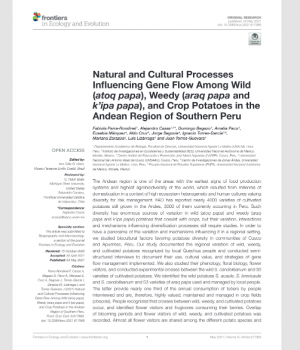
The Andean region is one of the areas with the earliest signs of food production systems and highest agrobiodiversity of the world, which resulted from millennia of domestication in a context of high ecosystem heterogeneity and human cultures valuing diversity for risk management. FAO has reported nearly 4000 varieties of cultivated potatoes still grown in the Andes, 3000 of them currently occurring in Peru. Such diversity has enormous sources of variation in wild (atoq papa) and weedy (araq papa and k’ipa papa) potatoes that coexist with crops, but their variation, interactions and mechanisms influencing diversification processes still require studies. In order to have a panorama of the variation and mechanisms influencing it in a regional setting, we studied biocultural factors favoring potatoes diversity in communities of Cusco and Apurimac, Peru. Our study documented the regional variation of wild, weedy, and cultivated potatoes recognized by local Quechua people and conducted semi-structured interviews to document their use, cultural value, and strategies of gene flow management implemented. We also studied their phenology, floral biology, flower visitors, and conducted experimental crosses between the wild S
